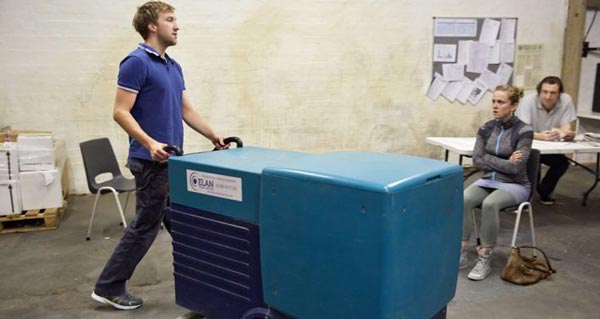Beyond Caring
The NT Temporary Theatre
1 May 2015
3 Stars
The room is dinghy. A storeroom, perhaps, in a manufacturing plant. A plant that produces sausages. It’s lit by unrelentingly harsh fluorescent lights which, in the way of such lights, flicker and emit high piercing sounds intermittently. Five people are working. Cleaners. Two have gone to get some supplies. One is asleep at the bench table. The other two are sharing a climactic, unexpected moment.
In the auditorium, someone collapses. A chair clatters. An usher calls for help. Onstage, the climactic moment continues, ascending to its zenith. The someone is still down. The usher looks panicky, calls on an IPhone for assistance. No one goes to his aid or the aid of the someone. The climactic moment reaches its crescendo, falls into the stupor, the silence of the aftermath. Audience members look agitated. Then the someone rises and staggers away, the usher close at hand to assist.
The moment when reality of the social kind clashed with theatre of the social realism kind. Bizarre, confronting and discombobulating. Several audience members posited afterwards that the collapse was part of the play, that the staff were too calm, the actors not distracted. As explanations go, that seems possible. More likely, especially given the awkward presence of paramedical attendants and front of house staff caught suddenly in view of the audience when a door was opened, the collapse was real, a surprise. Real life competing with fake real life – and fake real life getting all the attention.
This is Beyond Caring, a new play devised by Alexander Zeldin and members of the original and current company at The Yard Theatre where it was first presented in July 2014. Now playing at the National Theatre’s Temporary Theatre, it is an unrelentingly grim examination of the lives of strangers who meet every day to fulfil a zero hours contractual obligation to clean. They are never sure of how many hours they have to work, when they will be paid and whether their “job” will continue.
To say the least, they are an odd bunch. Phil is a former Auxillary Nurse, taciturn to the point of tomb-like silence, an aficionado of Dick Francis horsey novels. Susan is timid, desperate, probably homeless and has little to eat, no cash to spare. Grace is physically disabled, but has been certified as able to work and so must work despite the pain the manual labour causes her. Becky is quietly belligerent, a hard, fast worker, a woman unafraid of men. Ian, the Night Shift Manager, is a bloodless ghoul, pretentious in the way petty bureaucrats are, punctilious, odious and hypocritical.
There is something undeniably fascinating about watching strangers find common ground, about seeing a team form in adverse circumstances, especially where, as here, the pains and troubles which silently vex them remain largely unventilated. The narrative twists might not be very surprising, but the unsparing truth in the playing and the sadly familiar straightened circumstances of these characters, together with the plain hideousness of their employment, combine to make this unsettling, uncomfortable viewing.
Each of the five actors – Luke Clarke, Janet Etuk, Kristin Hutchinson, Victoria Moseley and Sean O’Callaghan – is exemplary, with Clarke being particularly fine as the odious, time and porn watching passive aggressive qtyrant, and Moseley a mousy, desperate, nervous flutterball.
That said, Beyond Caring is hard work. It is well done, but very long at 90 minutes, and there is little light relief to the bleak lives and misfortunes which play out under the fluorescent lights. Shining a light on the travails of those sentenced to zero hour contracts is important and worthy, but the dramatic expression of that situation could do with more care, attention and dynamism.
Alexander Zeldin ensures that what variety and interest exists in the narrative is fully mined and the final image of the five, unrelentingly and continually cleaning, water and cleaning products everywhere, is both powerful and supremely shocking.
It is society which is beyond caring about the fate of these hard working real people. As the play demonstrates, against the odds, they themselves are not beyond caring for each other and, in a reflection of the humanity that we all hope is reflected in our own selves, excel at such care. However quietly, or secretly, they go about it.
The question the play poses, however, is, having seen it, what are audience members prepared to do to demonstrate they are not beyond caring? The incident with the collapsed someone sadly, but sharply, suggested the answer.

